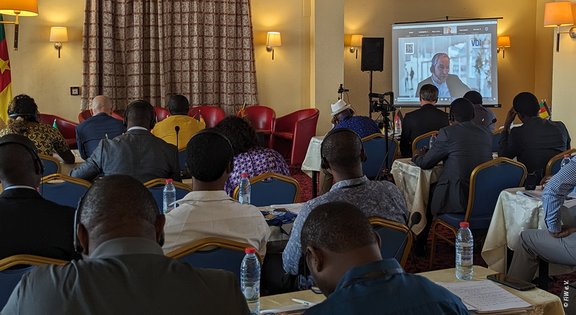Successful INTEWAR closing conference in Cameroon
The German-Cameroonian consortium of the BMBF-funded INTEWAR project successfully organised its final conference in Yaoundé in mid-November after three years of project work.
The German-Cameroonian consortium of the BMBF-funded INTEWAR project successfully organised the final conference in Yaoundé in mid-November. The results of the three-year project were presented and discussed with around 50 participants from politics, local authorities, science and aid organisations. At two round tables, experts provided an outlook on how to meet the challenges ahead in the areas of WASH and disaster risk reduction. The work of the project will be completed at the end of the project in December 2023.
The sixth joint project trip of the consortium to Cameroon took place with the participation of staff from FiW, IHPHS, IASU and IWW. These included a sensitisation training organised by IHPH with the University of Yaoundé I and a flood protection workshop jointly organised by IWW, FiW, Ciel Bleu and the University of Yaoundé I. The workshop not only provided theoretical knowledge on private and communal flood protection, but also involved the practical implementation of a construction measure in small teams. The final acceptance of the wastewater treatment plant at the University of Yaoundé I, which uses plastic bottle caps, was also successfully completed.
The trip concluded with the inauguration of the last ultrafiltration plant for improved drinking water security in Ngousso, Yaoundé. Project coordinator Dr. Manuel Krauss and the consortium were invited by the Mayor of Yaoundé V, Monsieur Augustin Bala, and his team to cut the ribbon on the plant. The ceremony was attended by representatives of the local administration and a large number of local residents. The plant was completed in recent months by the Cameroonian partner, AURA, and is the third drinking water treatment plant to be built and handed over in Cameroon. The first plant was commissioned in Soa in 2022, while the second plant in Montana City in Douala was handed over during the last project visit in August. Prior to commissioning, training sessions and workshops were held with the Cameroon Water Committee on topics including WASH and the joint development of a sustainable operating concept.
The INTEWAR project aims to develop a holistic approach to the prevention and management of floods, droughts and water-related diseases in three exemplary pilot regions. Specific components include protection concepts for critical infrastructure and buildings, a monitoring concept for drinking water quality, and alarm and contingency plans for disaster management. A decentralised water treatment plant will ensure the supply of clean drinking water to the population in the event of a disaster. Awareness-raising and training activities will be carried out to raise the local population's awareness of the link between hygiene, health and drinking water quality. The results of the project should enable the Cameroonian authorities in the pilot regions to independently assess flood risks, prevent natural disasters and minimise the health risks resulting from these disasters.









